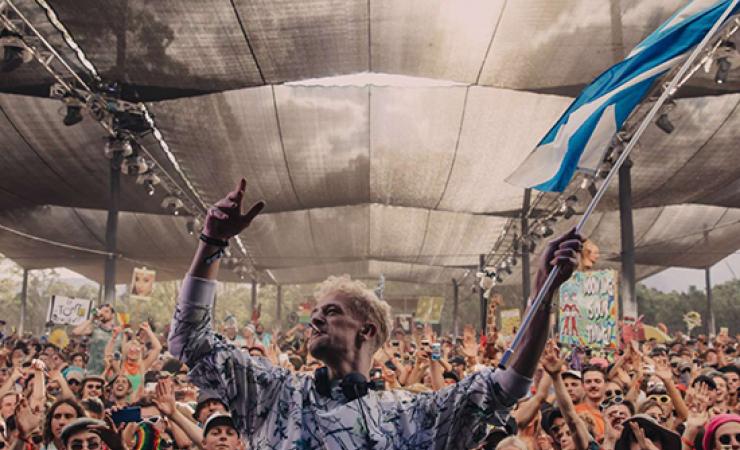When pulling together the logistics for a brand new music festival, Novel Tours and Events knew they could rely on the performance of Stage and Screen.

Artificial intelligence (AI) could be the most revolutionary development in travel since commercial flight, transforming the way we book, navigate, stay and play.
BEFORE YOU GO
The ability of AI to understand text, voice and image as well as learn from experience is already taking online booking to the next level. Chatbots, which answer customers’ questions in digital conversations, are being integrated into the various online booking platforms. Flight Centre’s chatbot Sam (Smart Assistant for Mobile), operates like your personal travel agent and its skills include organising business trips into an easy-interface itinerary, updating on any changes to your travel plans, sharing your location, organising rides with Uber or Lyft, and drawing on more than 60 detailed city guides and departure gate and baggage claim information to keep you fully clued up on the move.
HOTELS THAT THINK
Virtual concierges, intelligent rooms and holographic meetings are already re-shaping the modern hotel experience.
Amazon’s Alexa voice assistant has already been integrated with ‘internet of things’ technology in major hotel chains including Wynn and Marriott to enable smart rooms configurable by voice command. Alexa- and other voice assistant technology- can control the TV, lower the blinds, adjust the temperature, order room service and make front desk requests. Ivy, from Go Moment, is an artificial intelligence-driven system capable of handling, in real time, 90 percent of a hotel’s guest requests without human intervention. Powered by IBM’s Watson, Ivy is already servicing guests at Las Vegas’ Caesars Entertainment properties. The newest systems, such as Innspire, do away with the app interface, allowing guests to access a raft of services from any screen – including all their own devices, via their internet browser. In the future, entire front desk services could be replaced by AI-driven chatbots that can schedule tasks, book taxis, and check you in and out of the hotel.
Meanwhile, fast growing ‘holographic telepresence’ technology not only enables business meetings between parties beamed in from various locations as 3D holograms – but also presents the enticing possibility of holographic customer service and butlers.
ROBO-BUTLER – AND FRIENDS
It’s no surprise that Silicon Valley’s Cupertino, home to Apple’s global headquarters, also houses a hotel with a robot butler. Aloft Cupertino’s Botlr, complete with dinky bowtie and tux, will fetch your towels poolside, and deliver snacks and toiletries to your room in answer to a call from your smartphone.
At Geneva Airport's Terminal 1 a robot called Leo will carry your cases to the baggage dock at check-in, and at Dusseldorf Airport, Ray the robotic valet parking system invites you to drive into a giant box which measures the vehicle before a forklift-like machine carries it to a parking spot. Ray is connected to the flight database so it knows when you’re coming to collect the car and if your schedule changes.
In 2016, Hilton launched a pilot program with IBM to test Connie, a Watson-enabled robot concierge capable of walking, pointing, understanding and responding to human emotions, and at Yotel New York, a robot named Yobot retrieves and delivers luggage from storage bins, at your touchscreen command.
Back in tech-crazy Cupertino, at the Crowne Plaza San Jose, a three-foot-tall robot named Dash delivers room service snacks and phones guests to let them know he's waiting outside the door. At Residence Inn LAX, another version of the bot, Wally, has proved so popular that general manager Tom Beedon attributes a rise in repeat business to the little bin-shaped bot’s charm. The Renaissance Hotel Las Vegas has butler bots called Elvis and Priscilla. They’re all models of the Relay robot made by tech company Savioke, and CEO Steve Cousins has said: “We designed it to help out the staff, but it turns out that even more than that, we are delighting the guests.” In the future, the Relay model’s fast improving conversation skills could enable it to perform more complex roles in a hotel, such as waiting tables or manning a concierge station.
BOTS ON THE MOVE
In the UK, online rail booking service Trainline has launched BusyBot to predict overcrowding. When passengers use the ‘live tracker’ in Trainline’s app, the chatbot pops up to ask how busy their train is, then uses this crowd-sourced info to let other passengers planning their travel know if they’re likely to find a seat. Closer to home, Transport NSW has chatbot RITA (Real-time Intelligent Transport Assistant) on its Facebook Messenger, providing real-time train, bus, ferry and light rail arrival information.
By Amy Cooper
